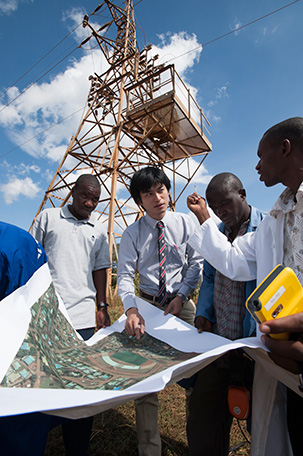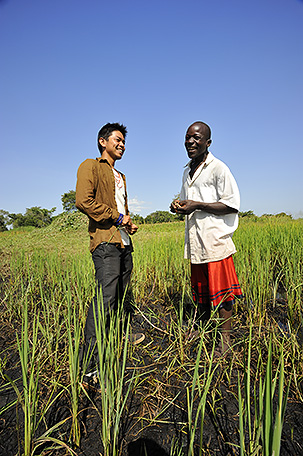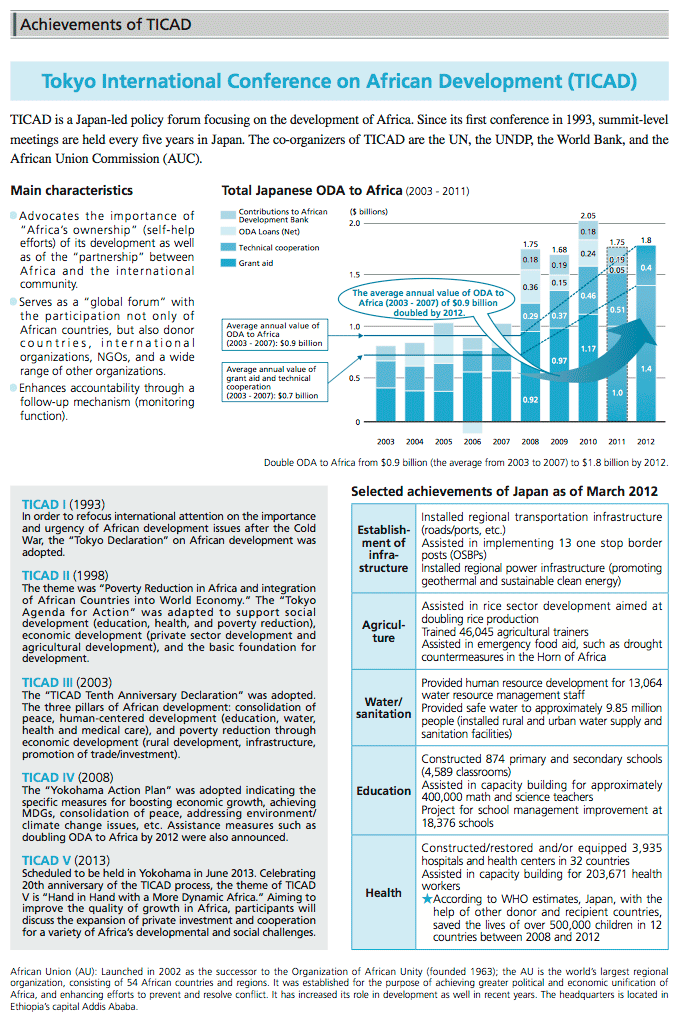Japan's Official Development Assistance White Paper 2012
ODA Topics
African Development: Current Status and Challenges towards TICAD V

In recent years, Africa's average economic growth rate has exceeded 5% and against the background of soaring commodity prices, trade has quadrupled over the last 10 years. At present, Africa is attracting international attention as the continent of hope and opportunity, increasing its presence in the international community as the next economic frontier after Asia. Even so, Africa still faces conflict, poverty, hunger, economic disparities, and other challenges that need to be overcome. Africa also has advantages that it can leverage, such as rich natural resources and a demographic dividend, meaning its working-age population is relatively high compared to that of children and the elderly and can positively affect economic growth. With support from the international community, Africa aims to maintain its current economic growth, create an economy and society that allows all of its people (including socially vulnerable groups like women and the poor) to enjoy benefits, and increase its resilience to withstand economic and social changes and the threats presented by natural disasters like droughts.
One of the challenges that Africa has been addressing is infrastructure development. Despite benefiting greatly from soaring commodity prices, some aspects of African economies are still easily influenced by world economic trends. For this reason, Africa needs to promote diversification of industry to achieve robust and sustainable growth. The infrastructure development that will lay the foundation for the robust and sustainable economy has grown in importance. Developed by African leadership, the Programme for Infrastructure Development in Africa (PIDA) lays out plans for 51 investment projects totaling $68 billion between 2012 and 2020 in the fields of transportation, energy, water resources, and information and communications technology (ICT). It will be a key issue for African countries and donor countries like Japan to come up with creative ways to implement these investment projects on a commercial basis through public-private partnerships.
Agriculture and food security is another challenge faced by Africa. Africa's agricultural sector provides a lot of employment, and development of agriculture and rural communities will contribute to poverty reduction if it gives consideration to small-holder farmers and women. Africa has been a net food importing region since 1980s. With crisis looming from frequent droughts and soaring worldwide food prices, it is another key issue to increase more food production within Africa in the light of food security. Currently, in the Comprehensive Africa Agriculture Development Programme (CAADP), which aims to prioritize the agricultural investment under the African leadership, each country has been promoting policies aimed at increasing annual rates of agricultural productivity by 6% and allocating 10% of their national budgets to agricultural investment. Climate change is also a serious problem tied closely with African agriculture. Support for adaption to climate change (selective breeding of drought-resistant crops, building of irrigation facilities, etc.) is another challenge faced by the region.

Workers investigate land prices for power lines with Japanese expert in Rwanda. (Photo: Kenshiro Imamura/JICA)
In terms of health, there has been a certain degree of success in preventing the spread of HIV/AIDs. However, further measures in the field of maternal and child health are needed to reduce maternal and infant mortality rates. Comprehensive efforts aimed at accelerating the achievement of Millennium Development Goals (MDGs) are also needed for the entire Africa, especially for those countries struggling to achieve their MDGs by 2015.
Peace and stability are prerequisite to establishing a robust and sustainable economy and building an inclusive and resilient society for achieving MDGs. To meet these prerequisites, Africa has been proactive in addressing a number of problems through the African Union (AU) and regional organizations, including those of Sudan and South Sudan, piracy off the Coast of Somalia, and the Sahel region (the area in West Africa at the southern tip of the Sahara Desert). The international community also needs to buck up African efforts to consolidate peace in the region.
As a Japan-led policy forum that focuses on African development, the Tokyo International Conference on African Development (TICAD) is one of the major global platforms for assistance to Africa. Since TICAD I was held in Tokyo in 1993, TICAD has emphasized the twin principles of ownership for African countries and partnership between Africa and the international community including Japan in promoting African development efforts. TICAD is jointly organized by Japan, the African Union Commission (AUC), the United Nations, the United Nations Development Programme (UNDP), and the World Bank. It is an international forum in which a great number of international organizations, regional organizations, civil societies, donors and Asian countries participate to discuss African development. More than just a platform for Japan to express support for Africa, it has also served as a platform to share Asian development experiences with Africa to strengthen partnership between Africa and its development partners. The TICAD process marks its 20th anniversary in June 2013 when TICAD V is held in Yokohama.
Over 3,000 people consisting of 51 African countries including 41 Heads of State, donor countries, and international organizations attended TICAD IV in Yokohama in 2008, making it the largest international conference ever to be held in Japan.
At TICAD IV, the Yokohama Action Plan was adopted to establish a direction for development in Africa, while Japan pledged further assistance to Africa. As its major pledges, Japan committed itself to doubling ODA provided to Africa to $1.8 billion by 2012 and doubling support for Japanese private investment in Africa to $3.4 billion by 2012. So far, Japan has steadily worked to honor these pledges.
After TICAD IV, the TICAD Ministerial Follow-up Meeting was established as a follow-up mechanism aimed at providing high-level policy guidance, reviews and evaluations of Yokohama Action Plan implementation. This meeting has been held in Africa every year since 2009 and receives high praise from the African side as a model that improves the accountability of Japan and other donors.
At the Fourth TICAD Ministerial Follow-up Meeting held in Morocco in May 2012, participants discussed issues for TICAD V, including: (i) Africa's current economic growth and underlying challenges, (ii) Achieving MDGs in Africa and the post-MDG agendas to be addressed after 2015, (iii) consolidating peace and good governance, and (iv) climate change. These issues correspond to the aforementioned Africa's development challenges. To overcome these challenges, it is important both for donors to support Africa and for Africa to strengthen voluntary efforts that exhibit ownership. Africa and donors including Japan must cooperate for the success of TICAD V.
At TICAD V, it will be important to promote involvement of the private sector through public-private partnership (PPP). In August 2012, the TICAD V Joint-Consultative Meeting for Public Private Partnership was started ahead of TICAD V to examine how best to promote public-private partnership in support of trade and investment in Africa. Co-chaired by the Minister for Foreign Affairs and the vice chairman of the Japan Business Federation (Keidanren), participants include top executives of major Japanese companies and representatives from related government ministries and agencies. At the Meeting, specific recommendations will be provided based on discussions on measures that the Japanese government and African countries should take in order to encourage Japanese companies to expand their business in Africa.
In June 2013, TICAD V will aim to establish robust and sustainable economy, build resilient and inclusive society to achieve MDGs, and consolidate peace and stability in Africa. To this end, Japan will promote measures that should prove useful in strengthening ownership from African nations and partnership between them and development partners. Through TICAD V, Japan expects to further strengthen its relationship with Africa and to continue developing it into a win-win relationship that benefits both parties.

Ugandan farmer chats with a JOCV at a NERICA rice farm. (Photo: Koji Sato/JICA)

